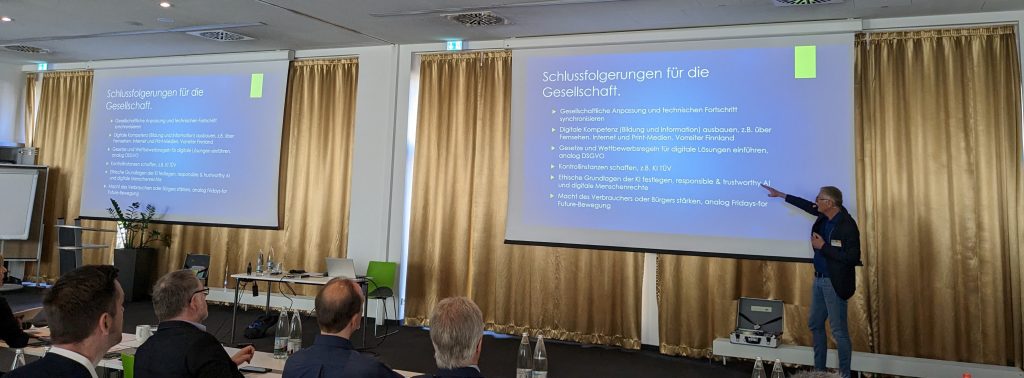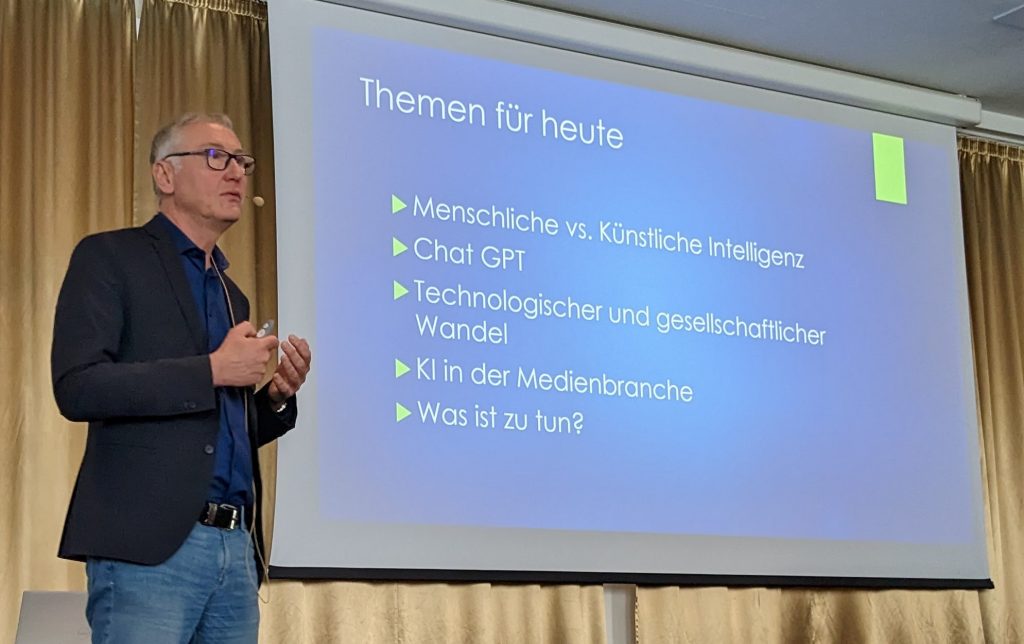Interview with Prof. Dr Markus Dahm: “Don’t be afraid of AI – opportunities for business and society”.

Prof. Dr. Markus Dahm
Prof. Dr Markus Dahm is a professor at a private university, consultant, book editor (“Wie künstliche Intelligenz unser Leben prägt“), book author, journalist and ARIC (Artificial Intelligence Center Hamburg) Ambassador. He publishes in scientific journals, anthologies, blogs and online magazines as well as in the business press.
You can see his enthusiasm for the topic of artificial intelligence: At alfa Media’s Customer Day 2023, he was able to captivate those who were present during his 45-minute keynote speech on the topic of “Don’t be afraid of AI – opportunities for business and society”. There, he shed light on the current discourse surrounding the further development of AI text tools such as ChatGPT and addressed the expectations, benefits and opportunities of this technology. A good reason for us to talk to him again about these exciting topics and to present Prof. Dr. Dahm’s insights on the topic of AI to all those who could not be present at our customer day.
Nadine Kaiser (alfa Media): Hello and thank you very much for giving us some insights into your work and for allowing us to learn from your experiences. Let’s start at the beginning: What do we consider to be AI?
Markus Dahm: Artificial intelligence (AI) refers to the ability of machines to solve complex problems and make decisions that would normally require human intelligence. There are different types of technologies used in AI systems, such as:
- Machine Learning: A method in which algorithms learn from experience without being explicitly programmed. This uses a large amount of data to identify patterns and correlations.
- Deep Learning: A subtype of machine learning based on artificial neural networks. This attempts to simulate the human brain by using multiple layers of neurons to recognise complex patterns in data.
- Natural Language Processing (NLP): An area of AI that focuses on the processing and analysis of human language. This uses technologies such as text analysis, sentiment analysis and speech recognition.
- Computer Vision: An area of AI that focuses on the ability of machines to understand and interpret visual information from images and videos. This uses technologies such as object recognition, face recognition and image recognition.
- Expert systems: Systems designed to capture and use human knowledge and expertise in a particular area. Here, rules and decision trees are used to make decisions and solve problems.
- Robotics: The use of machines and robots to perform automated tasks. This uses technologies such as sensors, actuators and artificial intelligence to control robots and make decisions.
There are many other technologies and applications in the field of artificial intelligence that are constantly being developed and open up new possibilities.
Nadine Kaiser: Where do you see the advantages and where the risks?
Markus Dahm: Advantages of AI can be found in many areas …
- Increasing efficiency: AI systems can perform automated processes that normally have to be done by humans. This allows companies and organisations to save time and resources.
- Improved decision-making: AI systems can process and analyse large amounts of data to identify patterns and correlations. This allows better decisions to be made based on sound insights.
- Personalisation: AI systems can be tuned to individual needs and preferences to create personalised experiences. This allows companies and organisations to better serve their customers and strengthen customer loyalty.
- Improved security: AI systems can help minimise security risks by identifying potential threats and taking countermeasures.
However, risks of AI are also present …
- Data protection: AI systems often process large amounts of data that may contain sensitive personal information. This can lead to data protection breaches.
- Job loss: AI systems can automate tasks that are normally done by humans. As a result, jobs may be lost or changed.
- Bias: AI systems can be influenced by biases and prejudices inherent in the data on which they are based. This can bias decisions and results.
- Ethics: AI systems can raise complex ethical issues, especially in the area of autonomous systems such as autonomous vehicles. There are questions about who takes responsibility for decisions and actions of AI systems.
It is important that both the benefits and risks are carefully weighed when developing and implementing AI systems.

Prof. Dr. Markus Dahm at the alfa Media Customer Day 2023
Nadine Kaiser: Where can AI have the most potential?
Markus Dahm: AI has the potential to bring significant benefits in many areas, but some of the biggest opportunities lie in the following areas:
- Healthcare: AI can help improve medical diagnoses and decisions by analysing large amounts of data and recognising patterns and correlations. This can help develop better treatment options and enable personalised medicine.
- Finance: AI can help detect fraud, minimise risks and improve decisions related to investments and financing. This enables financial institutions to operate more efficiently and safely.
- Production and manufacturing: AI can help improve efficiency and quality in production by performing automated processes and using machine learning to optimise production processes.
- Transport and logistics: AI can help improve the efficiency of transport and logistics processes by using automated systems and autonomous vehicles to manage traffic and optimise deliveries.
- Education: AI can help develop personalised learning methods that are tailored to individual student needs. This allows students to learn more effectively and teachers to improve their teaching methods.
Overall, there are many areas where AI has the potential to bring significant benefits. However, it is important that the implementation of AI systems is carefully considered to ensure that their benefits are maximised and their risks minimised.
Nadine Kaiser: Opinions are divided on the subject of ChatGPT. How do you assess the benefits of Chat GPT?
Markus Dahm: As an AI model, ChatGPT is a tool that can have a wide range of applications and uses. For example, it can be used for text generation, translation, summarisation, chatbots, Q&A systems and many other applications. As an AI model, ChatGPT can help automate human work, enabling efficiency and scalability. ChatGPT can also help facilitate communication and overcome barriers such as language barriers. However, there are also concerns about the ethics and security of ChatGPT, especially with regard to the possibility of misuse and misinformation. It is therefore important that the use of ChatGPT and similar models is carefully considered and that appropriate safeguards are implemented to minimise potential risks. Overall, the benefits of ChatGPT and similar AI models are varied and depend heavily on the specific application and context.

Prof. Dr. Markus Dahm at the alfa Media Customer Day 2023
Nadine Kaiser: What about the copyright factor in this context?
Markus Dahm: The issue of ChatGPT and copyright is complex and raises a number of questions, especially with regard to the use of texts and other content generated by ChatGPT. On the one hand, ChatGPT can help to improve the efficiency of work processes and automate content creation. However, this may also lead to copyright infringement if ChatGPT creates content based on existing works.
It is important that the use of ChatGPT and similar AI models is carefully considered in terms of copyright. It is important to ensure that content created by ChatGPT is lawful and does not infringe existing copyright. It is also important that ChatGPT and similar AI models continue to evolve in terms of copyright to ensure that they are in line with the evolving legal framework.
Overall, the issue of ChatGPT and copyright is an important and complex one that needs to be carefully considered to ensure that all parties involved are treated fairly and equitably.
Nadine Kaiser: Data protection also often plays a role in this discussion. At the beginning of April, Italy announced that it would ban artificial intelligence. How do you view this step?
Markus Dahm: A ban on the use of ChatGPT and other AI models is because the government has concerns about the use of AI systems. I don’t think this makes sense. It is important that such bans are well thought out and proportionate and that they do not hinder the development and use of AI technologies.
Overall, it is important that AI systems are used responsibly and ethically to maximise the benefits of AI and minimise the risks. It is also important that governments and organisations establish appropriate legal and ethical frameworks to ensure that AI systems can be used safely and effectively.
Thank you very much for the interview!